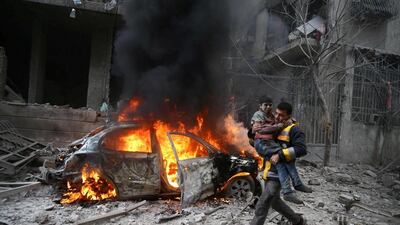On March 15, 2011, Damascus, the capital of Syria, echoed with the cries of demonstrators demanding accountability from their government. In a country saturated with regime spies and congested with torture chambers, the courage of the early protesters was truly exceptional. They placed everything at risk by speaking against president Bashar Al Assad. An optimistic belief in the fundamental decency of humanity coursed through the inchoate uprising as it confronted one of the most brutal regimes on earth: Syrians seemed to believe that Mr Al Assad would not be allowed by the world to massacre his way to victory.
Seven years on, how tragically unfounded such faith in the world looks. More than half a million Syrians have been killed. Two million Syrian children are out of school. Some 13 million people are internally displaced and another five million live as refugees in neighbouring countries. It is virtually impossible to relate the shattered landscape of Syria today to the vibrant life that once animated it. The ruins of Syria have become breeding grounds for the most virulent strains of extremism, that will long outlive the civil war. As a special report by The National shows, the seven-year-long civil war in Syria has put on display not only the depths of the Assad regime's savagery but also the appalling failures of the world, its great powers and its institutions to bring the conflict to an end.
Former US president Barack Obama's threat to impose severe costs on Mr Al Assad if chemical weapons were ever used in Syria was followed by obfuscation and evasion when the regime did exactly that. Mr Obama's refusal to uphold his own "red line" with decisive action gave the game away: Russia, realising that Washington's words were just hot air, intervened to safeguard Mr Al Assad and annihilate the rebellion. The United Nations has convened repeatedly to halt the violence in Syria – only to be thwarted by Moscow. Chemical weapons have now been used by the regime in at least eight instances. The crisis in Syria, as Charlotte McDonald-Gibson writes in The National, "has shown empathy to be a fleeting emotion". Countries across Europe have barricaded themselves against the homeless and horrifying stories of the degrading treatment meted out to Syrian refugees continue to proliferate.
There is emerging discussion in some quarters of repatriating asylum applicants to Syria, a country that is currently the site of a proxy war involving Russia, Iran, the United States and Turkey. Mr Al Assad, meanwhile, has reduced Eastern Ghouta, the rebel-held enclave outside Damascus, to rubble. It would be an act of unpardonable self-deception, as Syria enters the eighth year of war, for the world to treat it as a local or regional conflict. Syria, having drawn the world’s major powers into its quagmire, is a global crisis. It is the world’s responsibility to ensure that the eighth year of the civil war is the very last in this bitterly fought and catastrophic conflict.

